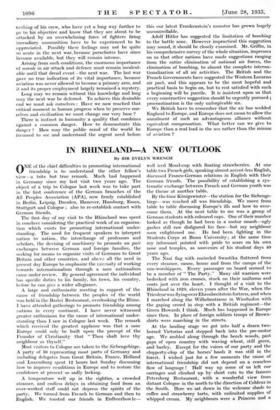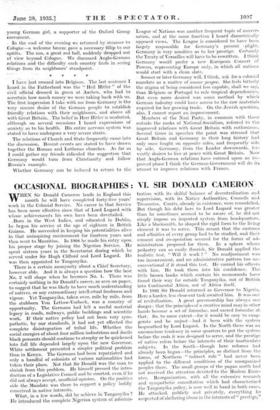IN RHINELAND -A NEW OUTLOOK
By SIR EVELYN WRENCH
ONE of the chief difficulties in promoting international friendship is to understand the other fellow's view—a trite but true remark. Much had happened in Germany since my last visit two years ago. The object of a trip to Cologne last week was to take part in the first conference of the German branches of the All Peoples Association (APA), now firmly established in Berlin, Leipzig, Dresden, Hanover, Hamburg, Essen, Stuttgart and Cologne ; also to re-establish contact with German friends.
The first day of my visit to the Rhineland was spent in conclave considering the practical work of an organiza- tion which exists for promoting international under- standing. The need for frequent speakers to interpret nation to nation, the interchange of professors and scholars, the devising of machinery to promote au pair exchanges between German and foreign families, the seeking for means to organize visits of Germans to Great Britain and other countries, and above all the need in present day Europe to emphasize the necessity of working towards internationalism through a sane nationalism came under review. By general agreement the individual has specific duties to his family, his town, his country, before he can give a wider allegiance.
A large and enthusiastic meeting in support of the cause of friendship between the peoples of the world was held in the Bastei Restaurant, overlooking the Rhine.
I have attended gatherings to promote friendship among nations in every continent. I have never witnessed greater enthusiasm for the cause of international under- standing than I saw in Cologne last week. The remark which received the greatest applause was that a sane Europe could only be built upon the precept of the Founder of Christianity that " Thou shalt love thy neighbour as thyself."
Most visitors to Cologne are taken to the Siebengebirge. A party of 50 representing most parts of Germany and including delegates from Great Britain, France, Holland and Luxemburg spent 12 hours last Sunday discussing how to improve conditions in Europe and to restore the confidence at present so sadly lacking.
A temperature well up in the eighties, a crowded steamer, and endless delays in obtaining food from an over-worked staff could not depress the spirits of the party. We turned from French to German and then to English. We toasted our friends in Erdbeerbow le— well iced Mosel-cup with floating strawberries. At one table two French girls, speaking almost accent-less English, discussed Franco-German relations in English with their German friends. The possibility of establishing a sys- tematic exchange between French and German youth was the theme at another table.
By the time Konigswinter—the station for the Siebenge- birge—was reached all was. friendship. We move from table to table discussing Europe's ills and how to over- come them. At the next table to me was a group of German students with coloured caps. One of their number looked as though he had been in a motor smash—ugly gashes still raw disfigured his face—but my neighbour soon enlightened me. He had been fighting in the Students Corps at Bonn University; at the same time my informant pointed with pride to scars on his own nose and temples, as souvenirs of his student days 40 years ago.
The Nazi flag with encircled Swastika fluttered from every steamer, canoe, house and from the camps of the sun-worshippers. Every passenger on board seemed to be a member of " The Party." Many old warriors were bedecked with iron crosses, stuck on their uniforms and coats just over the heart. I thought of a visit to the Rhineland in 1929, eleven years after the War, when the Tricoleur was flying over Ehrenbreitstein fortress, and when I marched along the Wilhelmstrasse in Wiesbaden with the gaping crowd in step with a British regiment—the Green Howards I think. Much has happened in Europe since then. In place of foreign soldiers troops of Brown- shirts were marching in the streets.
At the landing stage we got into half a dozen two- horsed Victorias and stepped back into the pre-motor age. We ambled along through the beech woods, past gaps of open country with waving wheat, still green, and barley. Except for the voices of our party and the clopperty-clop of the horses' hoofs it was still in the forest. I wished just for a few moments the cause of international friendship did not depend on a ceaseless flow of language ! Half way up some of us left our carriages and climbed up by short cuts to the famous Petersberg Restaurant, with a wonderful view from distant Cologne in the north to the direction of Coblenz in the South. Here we sat down in the welcome shade to coffee and strawberry tarts, with unlimited supplies of whipped cream. My neighbours were a Princess and a young. German girl; a supporter of the Oxford Group movement.
In the cool of • the evening we returned •by: steamer to Cologne—a welcome breeze gave a necessary fillip to our spirits. The sun, a great red ball, suddenly dropped out of view beyond Cologne. We discussed Anglo-German .relations and • the difficulty each country finds in seeing things from its neighbours' standpoint. : • • * * * " * I have just crossed into Belgium. The last sentence I heard in the Fatherland was the " Heil Hitler ." of the civil official dressed in green at Aachen, who had to ascertain how much money we were taking back with us. The first impression I take with me from Germany is the very sincere desire of the German people to establish friendly relations with their neighbours, and above all with Great Britain. , The belief in Herr Hitler is unabated, although on several occasions I heard expressions of anxiety as to his health: His entire nervous system was stated to have undergone a very severe strain.
The relations of Church and State frequently came into the discussion. Recent events are stated to have drawn together the Roman and Lutheran churches. As far as I could gather my friends ridiculed the suggestion that Germany would turn from Christianity and follow Russia's example.
Whether Germany can be induced to return to the League of Nations was another frequent topic of conver- sation, and at the same function I heard diametrically opposed views. The League is considered to have been largely responsible for Germany's present plight. Germany is very sensitive as to her prestige. Certainly the Treaty of Versailles will have to be rewritten. I think Germany would prefer a new European . Concert of Powers, representing Europe only, in which all nations would start with a clean slate.
Sooner or later Germany will, I think, ask for a colonial mandate as a matter of amour propre. She feels bitterly the stigma of being considered less capable, shall we say, than Belgium or Portugal to rule tropical dependencies. But even more desired was some method by which German industry could have access to the raw materials required for her growing trade. On the Jewish question, alas, I cannot report an improvement. .
Members of the Nazi Party, in common with those outside the ranks of National-Socialism, referred to the improved relations with Great Britain with enthusiasm. Several times in speeches the point was stressed that Great Britain and Germany in their long history had only once fought on opposite sides, and frequently side by side. Germany, from the Leader downwards, fer- vently desires to live at peace with Great Britain. Now that Anglo-German relations have entered upon an im- proved phase I think the German Government will do its utmost to improve relations with France.







































 Previous page
Previous page